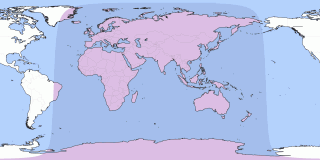Sep 17, 2016 at 6:23 am
Near max in Majuro
| Global Event: | Penumbral Lunar Eclipse |
|---|---|
| Local Type: | Penumbral Lunar Eclipse, in Majuro |
| Began: | Sat, Sep 17, 2016 at 4:54 am |
| Maximum: | Sat, Sep 17, 2016 at 6:24 am -0.132 Magnitude |
| Ended: | Sat, Sep 17, 2016 at 6:27 am |
| Duration: | 1 hour, 32 minutes | All Â鶹ӳ» shown on this page are local time. |
Eclipses and Transits Visible in Majuro
| Eclipse Visibility From Majuro | Visibility Worldwide | ||
|---|---|---|---|
| Jun 26–27, 2010 Partial Lunar Eclipse | Partial Lunar Eclipse |  | |
| Dec 21, 2010 Total Lunar Eclipse | Total Lunar Eclipse |  | |
| Jun 16, 2011 Penumbral Lunar Eclipse | Total Lunar Eclipse |  | |
| Dec 10–11, 2011 Total Lunar Eclipse | Total Lunar Eclipse |  | |
| Jun 4–5, 2012 Partial Lunar Eclipse | Partial Lunar Eclipse |  | |
| Jun 6, 2012 Venus Transit | Venus Transit |  | |
| Nov 14, 2012 Partial Solar Eclipse | Total Solar Eclipse |  | |
| Nov 29, 2012 Penumbral Lunar Eclipse | Penumbral Lunar Eclipse |  | |
| Apr 26, 2013 Penumbral Lunar Eclipse | Partial Lunar Eclipse |  | |
| May 10, 2013 Partial Solar Eclipse | Annular Solar Eclipse |  | |
| Apr 15, 2014 Total Lunar Eclipse | Total Lunar Eclipse |  | |
| Oct 8–9, 2014 Total Lunar Eclipse | Total Lunar Eclipse |  | |
| Apr 4–5, 2015 Total Lunar Eclipse | Total Lunar Eclipse |  | |
| Mar 9, 2016 Partial Solar Eclipse | Total Solar Eclipse |  | |
| Mar 23–24, 2016 Penumbral Lunar Eclipse | Penumbral Lunar Eclipse |  | |
| May 10, 2016 Mercury Transit | Mercury Transit |  | |
| Sep 17, 2016 Penumbral Lunar Eclipse | Penumbral Lunar Eclipse |  | |
| Aug 8, 2017 Partial Lunar Eclipse | Partial Lunar Eclipse |  | |
| Jan 31–Feb 1, 2018 Total Lunar Eclipse | Total Lunar Eclipse |  | |
| Jul 28, 2018 Partial Lunar Eclipse | Total Lunar Eclipse |  | |
| Jan 21, 2019 Partial Lunar Eclipse | Total Lunar Eclipse |  | |
| Dec 26, 2019 Partial Solar Eclipse | Annular Solar Eclipse |  | Note: Click on the date link for details in Majuro, or the path map image for global details. Currently shown eclipse is highlighted. |
Next total solar eclipse visible in Majuro
Next annular eclipse visible in Majuro
